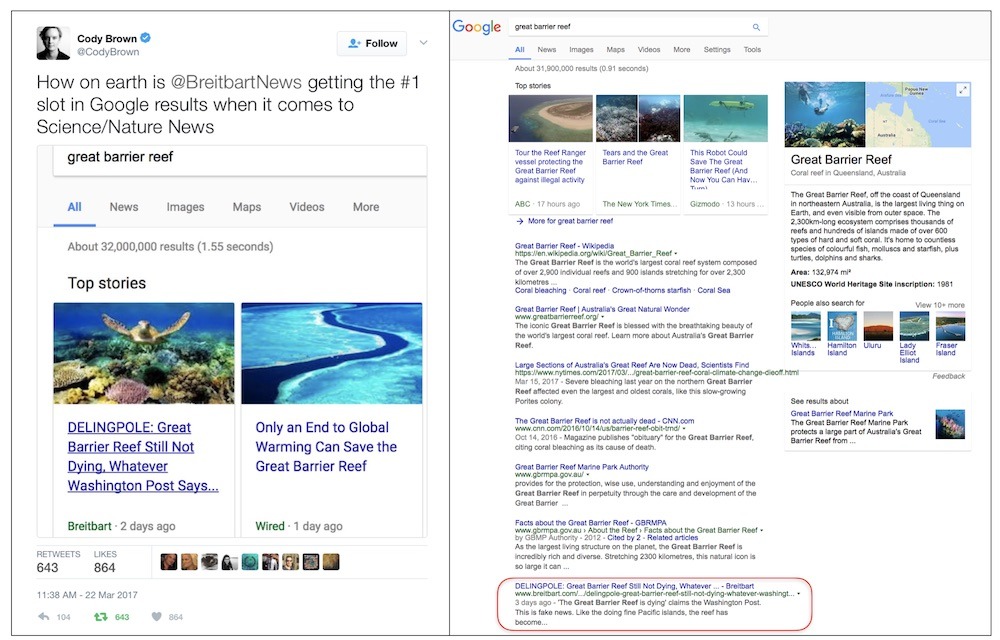Google's algorithmic efforts to "organize the world's information and make it universally accessible and useful" are again facing a critical failure, calling into question confidence in the search giant's unfinished, buggy artificial intelligence that's currently stomping all over its mission statement.
Query results facing a quandary
Recent reports have noted the embarrassing inability of Google's "Featured Snippets" to correctly answer basic financial questions based on simple math, or the propensity of Google Home to confidently provide ridiculous answers that are based on outdated, failed prophecies of conspiracy theorists recorded in the fringe section of its YouTube library of videos.
Most recently, Google's search results for a nature subject ("Great Barrier Reef") were found to be prominently linking to a factually false political column posted by Breitbart, which rather than offering any actual information, simply opines without any supporting logic that "we have got to the point where a large fraction of the science we see cannot be relied upon."
A day later, the "story" still appears in Google's top ten search results for "Great Barrier Reef," like Wikipedia vandalism slowly moving downward in an article rather than being removed by a human editor.
The reason Google links to a fringe political site for science-related search results appears to be due only to the fact that Google approved the entire site as a source of news in general, dramatically increasing the site's visibility and putting it on an equal standing with legitimate publishers in every subject.
Google's stated mission to "organize the world's information and make it universally accessible and useful" was originally based on Page Rank, a novel way to determine the value of a particular document on the early web by examining how many and what other websites linked to it. Over time, Google has battled various efforts to "game" its search results with various tricks, requiring brilliant engineering work by the company's researchers to account for such shenanigans. It now appears Google has given up on its original mission, and now simply presents all information as equal regardless of its value or usefulness
It now appears Google has given up on its original mission, and now simply presents all information as equal regardless of its value or usefulness. Without human curation, and with the currently unimpressive ability of AI to distinguish between informative fact and low-value bloggeria, Google is devaluing its search results.
This is also resulting in blowback from many of Google's primary customers: its advertisers. By associating the brands of its customers with extremist videos and disturbing content, it is creating a brand crisis that's causing major ad buyers to pull their advertising dollars from Google, its network of web ads and its YouTube property. That shift began in the U.K. and most recently has erupted in the U.S., costing Google hundreds of millions of dollars while erasing its leverage to maintain control over how ads are placed.
As Google is forced to relinquish more pricing power and placement flexibility to its advertisers, it not only will become less profitable but also less competitive with other ad network competitors who can better target their audiences and promise less brand-embarrassment to ad buyers.
Google tries to better train its AI with human "quality raters"
Earlier this month, Danny Sullivan of Search Engine Land profiled Google's efforts to improve its ability to identify "potentially upsetting or offensive to searchers," a project that tasked 10,000 contractors with evaluating the top search results the site is currently offering. Unless it can figure out how to strike a better balance, Google may lose too much advertising revenue to continue its incremental "putting out fires" approach to fake news and false search results
"Quality raters do not have the power to alter Google's results directly," the report noted. "Instead, the data produced by quality raters is used to improve Google's search algorithms generally. In time, that data might have an impact on low-quality pages that are spotted by raters, as well as on others that weren't reviewed."
Google has been making some progress, particularly in cases where its false results have generated outrage. However, the vast scope of the information available on the web makes Google's task unbounded and essentially infinite. Unless it can figure out how to strike a better balance, Google may lose too much advertising revenue to continue its incremental "putting out fires" approach to fake news and false search results. That may require finding a new business model outside of paid placement search on the desktop, which the company still relies upon for the majority of its revenues.
Spotted by @brentdpayne, my favorite wrong One True Answer from Google so far. Stairs. We know the inventor who created them. In 1948! pic.twitter.com/NZTyiobPmX
— Danny Sullivan (@dannysullivan) March 8, 2017
Google faces its Apple Maps, Windows Vista moment
Google's false answers and fake news results bring to mind the critical reception of Apple's iOS 6 Maps, which were lambasted for depicting 3D images of twisted piles of aerial highways and distorted buildings, as well as providing incorrect or incomplete directions and locations, an issue Google itself exaggerated and promoted even as its own Google Maps provided outdated, incorrect or even illegal directions itself.
 Apple's reputation suffered with iOS 6 Maps flaws, even though distorted Flyover pics didn't result in pizzagate, ads for ISIS or climate change denial
Apple's reputation suffered with iOS 6 Maps flaws, even though distorted Flyover pics didn't result in pizzagate, ads for ISIS or climate change denialUnless it better manages its crisis of information organization and brand safety, Google could find itself in the position of Microsoft in the days of Windows Vista: highly vulnerable to new competition just as the computing landscape shifts dramatically.
Voice-based search has gained escalated attention in the era of Siri and Alexa, and Google's own assistant not only doesn't work across all Android devices, but is also being aggressively challenged by Google's primary Android partner, Samsung, which now has its own voice search system to promote.
Outside of voice, Apple's iOS platform has also increasingly promoted universal search of the web and deep search of data within apps, with increasing ties to alternative search engines outside of Google's results.
 Daniel Eran Dilger
Daniel Eran Dilger








-m.jpg)






 Charles Martin
Charles Martin

 Malcolm Owen
Malcolm Owen
 William Gallagher
William Gallagher

 Christine McKee
Christine McKee
 Wesley Hilliard
Wesley Hilliard









4 Comments
SOG...I agree with you on this.....Plus all the other negative crap that came out today about Google and their content on YouTube. I know I would never own anything made by google...the closest I get is my TV has an Android OS....but my TV does not have a Mic or Camera connected so I think I'm safe..;-)
Apple needs to team up with IBM and offer Watson as a means to answer questions and perform a search. Siri is not a search engine. It currently uses Apple's Spotlight search engine for local search results, but turns to Bing for web results.
What Siri needs is a huge knowledge (data) base for performing searches and asking questions - and that's exactly what IBM has in Watson.
Apple should just buy IBM. This gives Apple a much larger foot hold in the enterprise, not to mention a ton of advanced R&D and IP.
Who cares. DuckDuckGo is much better.